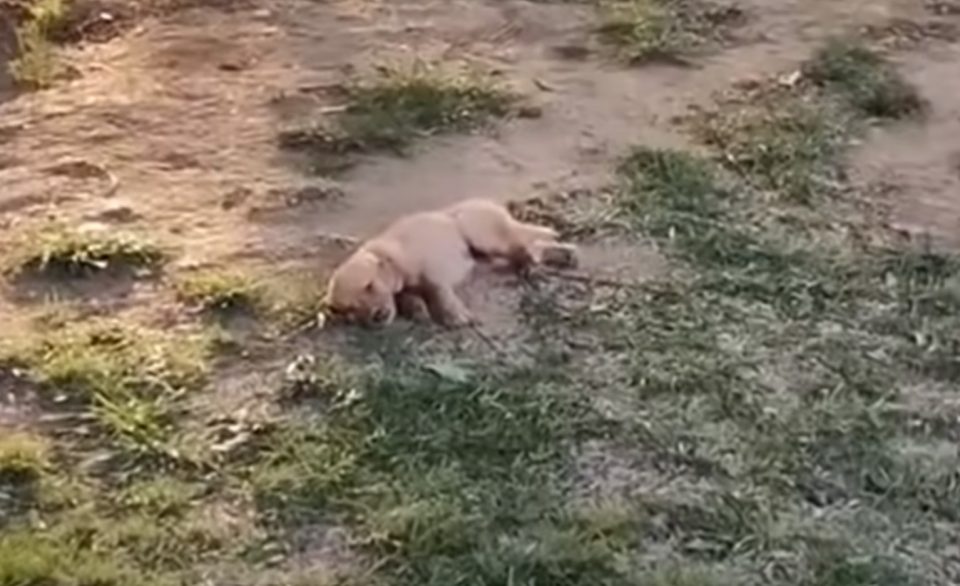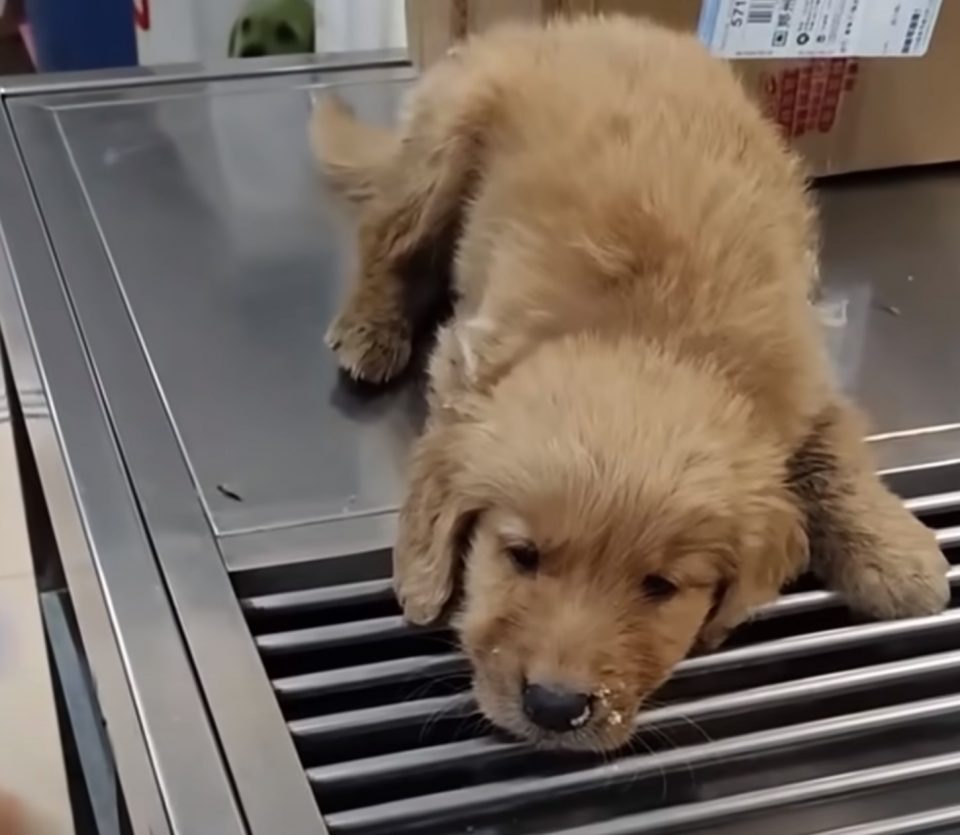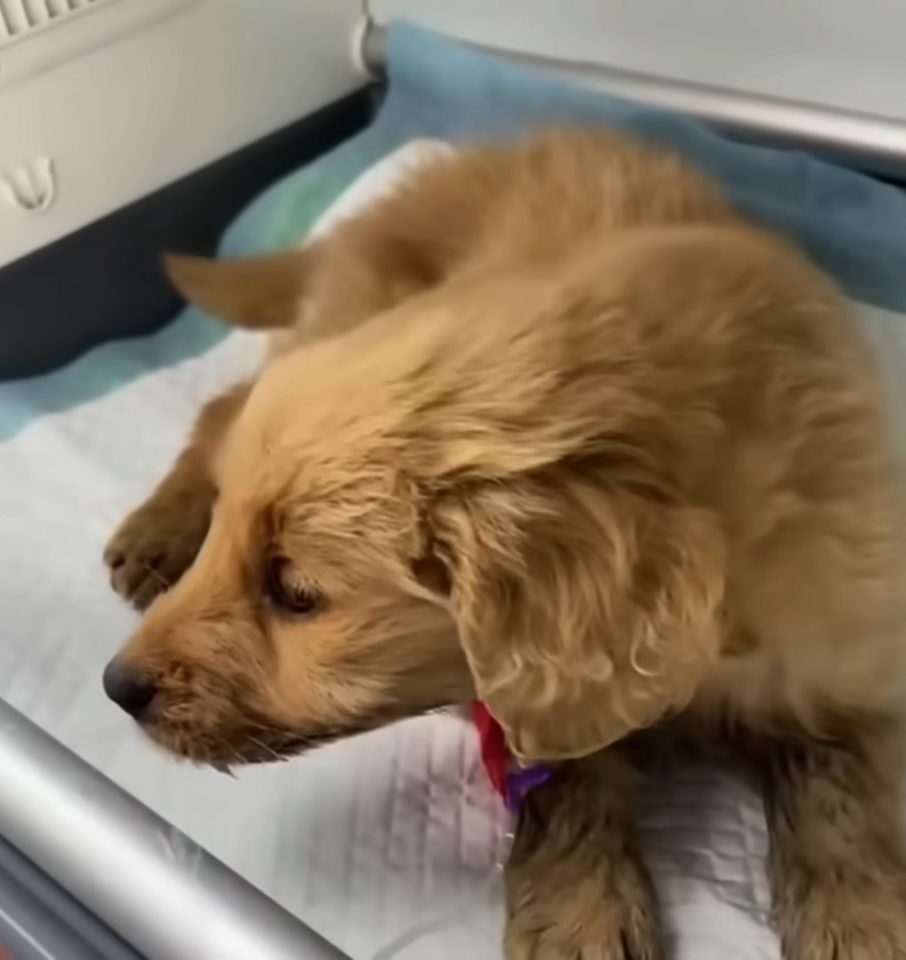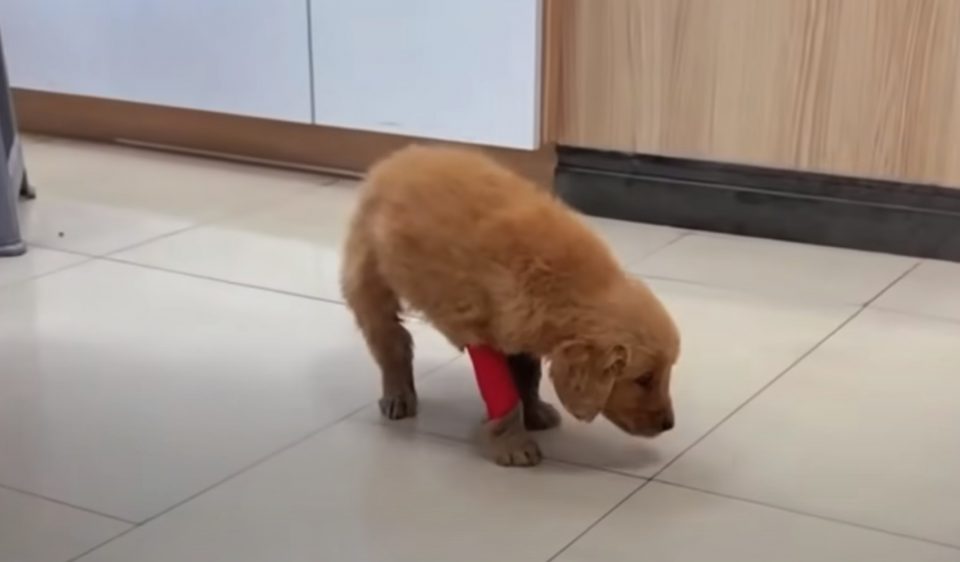When a team of rescuers were having a nice stroll in a park, they heard some strange and weak cries followed by the yells of a man.
Looking around, they noticed a man calling for help and pointing to something lying in the grass next to a tree. Upon further inspection, they realized that it was actually a little pup!
The pup, about two months old, was lying completely motionless on the ground.
The rescuers immediately rushed over to him, trying to figure out what was going on. After seeing wounds covering one of his legs, they knew they had to get him to the vet quickly!
Rescue Mission

The rescuers carefully got him in a box and made their way down to the local vet.
As soon as they arrived, the puppy was immediately transferred to the emergency room as he was in critical condition.
The pup was given a thorough checkup in order to determine what was wrong. His tests showed that he was running a fever and was very exhausted and malnourished as he hadn’t eaten at all in the past days.
The reason for this was the wound on his front leg that prevented him from walking and looking for food.

The doctors also determined that the pup had an intestinal infection, which was probably caused by something the pup ate. This infection resulted in a fever and dehydration.
They immediately put the pup on medications that would lower his fever as well as an IV that kept him hydrated.
After the medications, the doctors tended to the pup’s leg, which took a whole hour. After that, the pup was taken to a quiet room where he could relax.

After some time, the pup regained his strength and was able to move, and after four days, his health started to improve.
Recovery Journey
Thanks to the doctor’s determination and restless help, the puppy started to walk again.
His fever was gone, his infection was clearing up, and his wounds were healing fast! Everybody was so happy to see this pup become healthy again.
However, he still needed to be under constant observation so the rescuers took it upon themselves to take care of him and take him to all of his vet appointments.

One of the most important things now was to keep the pup as healthy and clean as possible because if he got sick, it would be much harder for him to recover.
But luckily, he was in very good hands.
Only one week after being rescued, the pup almost completely recovered. He was cleaning every bowl of food he was given, which allowed him to gain a lot of healthy weight, his infection completely cleared up, and he was very active.
But, spending a week at his foster home really did wonders for this pup.
Even though he needed some time to open up to his foster, this puppy was the happiest he had ever been.
He loves spending time with his family and is the best little boy ever!

His foster family quickly became his forever one as they could no longer imagine their life without him in it.
They provided him with everything he could ever need and, in return, he showered them in kindness and love.
Final Word
This pup went from almost giving up to having the best life a doggo could ever have.
He is now surrounded by incredible people who love showering him with love and affection, making him completely forget about his dark past.
I hope he will always have a smile on his face and will never have to worry about anything ever again. He deserves it!
If you’ve ever noticed your furry companion feeling a bit under the weather, you may have come across the term “giardia.” It’s not uncommon for dogs to encounter this pesky parasite during their outdoor adventures. Giardia, a microscopic parasite that can cause gastrointestinal issues, is something every dog owner should be aware of. While it may sound daunting, understanding giardia and its potential effects on your pup is crucial for their well-being. Stay tuned to learn more about this common concern among our canine friends.
Understanding Giardia in Dogs
Giardia is a common gastrointestinal parasite that dogs can pick up from contaminated water sources, soil, or feces of other infected animals. This tiny parasite can cause diarrhea, weight loss, and overall discomfort in your furry friend. Dogs can get infected by ingesting giardia cysts present in contaminated environments, making it essential to be cautious during outdoor activities.
Symptoms of Giardia Infection
If your dog is infected with giardia, you may notice symptoms such as diarrhea, vomiting, lethargy, and dehydration. Keep an eye out for changes in your dog’s stool consistency and frequency. If you observe any of these signs, consult your veterinarian for proper diagnosis and treatment.
Diagnosis and Treatment
Diagnosing giardia in dogs involves fecal testing to detect the presence of the parasite. Treatment typically includes medications prescribed by your vet to eliminate the infection. It’s crucial to follow the prescribed treatment plan diligently to ensure complete recovery and prevent re-infection.
Prevention Tips
To protect your dog from giardia, avoid letting them drink from potentially contaminated water sources and ensure they do not ingest feces from other animals. Practice good hygiene by cleaning up after your pet and maintaining a clean living environment. Regular veterinary check-ups can also help in early detection and prevention of giardia infection.
Conclusion
Understanding the risks of giardia in dogs is vital for responsible pet ownership. By staying informed about the symptoms, diagnosis, treatment, and prevention of giardia, you can help keep your canine companion healthy and happy. Stay proactive in safeguarding your dog’s well-being, especially during outdoor adventures.
Diagnosing Giardia Infection in Dogs
To diagnose giardia infection in dogs, your vet will typically conduct specific tests to confirm the presence of the parasite.
- Fecal Test: A fecal test is commonly used where a sample of your dog’s feces is examined under a microscope for giardia cysts.
- ELISA Test: Another method is the ELISA test, which detects giardia-specific antigens in the feces, providing a quicker diagnosis.
- PCR Test: Polymerase chain reaction (PCR) tests are also available and are highly sensitive in detecting giardia DNA.
- Symptoms Review: The vet will consider your dog’s symptoms such as diarrhea, vomiting, and weight loss, along with the test results.
- Blood Tests: In some cases, blood tests may be conducted to check for signs of anemia or other abnormalities caused by the infection.
Remember, early detection is key to effectively treating giardia in dogs and preventing further health complications. Regular veterinary check-ups and prompt action can help keep your furry companion healthy and happy.
Treatment Options for Giardia in Dogs
When it comes to treating giardia in dogs, your veterinarian will recommend a specific course of action based on your dog’s health condition. Here are the common treatment options for giardia:
1. Medication: Your vet may prescribe medications such as fenbendazole or metronidazole to treat giardia infection. These medications help to eliminate the parasites from your dog’s system.
2. Hydration: Ensuring your dog stays hydrated is essential during treatment. Encourage your furry friend to drink plenty of clean water to prevent dehydration caused by diarrhea.
3. Monitoring: It’s crucial to monitor your dog’s progress during treatment. Keep an eye on any changes in symptoms or behavior and report them to your vet promptly.
4. Environmental Cleaning: To prevent re-infection or spreading giardia to other pets, clean your dog’s living area thoroughly. Wash bedding, toys, and any areas your dog frequents with an appropriate disinfectant.
5. Follow-Up Testing: After the initial treatment, your vet may recommend follow-up fecal tests to ensure the giardia infection has been successfully cleared from your dog’s system.
6. Preventive Measures: To avoid future infections, practice good hygiene by ensuring your dog doesn’t drink from stagnant water sources and keeping outdoor areas clean to prevent contamination.
Remember, prompt veterinary care and following the treatment plan diligently are key to helping your dog recover from giardia infection and maintaining their overall health. Regular vet check-ups are essential to monitor your dog’s well-being and catch any health issues early on.
Preventing Giardia in Dogs
To protect your furry friend from giardia, consider the following preventive measures:
1. Clean Water Source
Provide your dog with clean, freshwater to drink. Ensure that their water bowl is regularly cleaned and refilled to prevent contamination.
2. Hygiene Practices
Maintain good hygiene practices by washing your hands after handling your dog, especially if they have been in areas with other dogs present.
3. Avoid Contaminated Areas
Be cautious when taking your dog to areas where other dogs frequent, such as dog parks or communal water sources.
4. Regular Veterinary Check-ups
Schedule routine check-ups with your veterinarian to monitor your dog’s health and discuss preventive measures against giardia.
5. Preventive Medication
Consult your vet about giardia preventive medications that may be suitable for your dog, especially if they are at a higher risk of exposure.
6. Proper Waste Disposal
Dispose of your dog’s waste promptly and appropriately to prevent environmental contamination and reduce the risk of giardia transmission.
7. Maintain Clean Living Spaces
Keep your dog’s living environment clean by regularly cleaning and disinfecting their bedding, toys, and living area.
By incorporating these preventive measures into your routine, you can help safeguard your dog against giardia infection and promote their overall well-being.
Conclusion
Keep your furry friend safe from giardia by following simple preventive measures. Remember to always provide clean water, maintain good hygiene, avoid contaminated areas, schedule regular vet check-ups, consider preventive medication, dispose of waste properly, and keep your living spaces clean. By taking these steps, you can protect your dog from giardia and ensure their continued well-being. Stay informed, stay proactive, and keep your pup happy and healthy.
Frequently Asked Questions
What is giardia in dogs?
Giardia is a common intestinal parasite in dogs that can cause diarrhea, vomiting, weight loss, and other gastrointestinal issues.
How is giardia diagnosed in dogs?
Veterinarians typically diagnose giardia through fecal tests to detect the presence of the parasite’s cysts.
What are the treatment options for giardia in dogs?
Treatment for giardia usually involves medications like metronidazole, fenbendazole, or other anti-parasitic drugs prescribed by a vet.
How can I prevent my dog from getting giardia?
Prevent giardia by providing clean water, maintaining good hygiene, avoiding contaminated areas, scheduling vet check-ups, and practicing proper waste disposal.
[no_toc]

Hey there, I’m Janet Brooks, a dog-loving student from California. I’m all about helping pups in need, especially those without homes. Me and my awesome friends work together to give shelter and love to stray dogs. Oh, and I also write blogs about dogs to share helpful info.